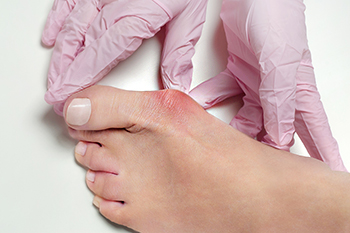

People who have bunions report it can be one of the most painful foot conditions to have. It is defined as a bony protrusion that forms on the side of the big toe, and will gradually become larger if treatment is not received. A bunion can be caused by genetic reasons, or from wearing shoes that have a tapered toe area. High heels can fit into this category, and it is beneficial to choose shoes that have a lower heel if these types of shoes need to be worn. Corns and calluses may form on top of the toes, as they touch the top of the shoe. This can be uncomfortable, and mild relief may be felt when the shoes that are worn can accommodate the bunion. If the bunion becomes severe and causes the inability to complete daily activities, surgery may be an option to consider for removal and permanent relief. If you see a bunion that is starting to form, it is suggested that you contact a podiatrist who offers you treatment options that are right for you.
If you are suffering from bunions, contact Dr. Todd Goldberg of Complete Family Foot Care Center. Our doctor can provide the care you need to keep you pain-free and on your feet.
What Is a Bunion?
A bunion is formed of swollen tissue or an enlargement of boney growth, usually located at the base joint of the toe that connects to the foot. The swelling occurs due to the bones in the big toe shifting inward, which impacts the other toes of the foot. This causes the area around the base of the big toe to become inflamed and painful.
Why Do Bunions Form?
Genetics – Susceptibility to bunions are often hereditary
Stress on the feet – Poorly fitted and uncomfortable footwear that places stress on feet, such as heels, can worsen existing bunions
How Are Bunions Diagnosed?
Doctors often perform two tests – blood tests and x-rays – when trying to diagnose bunions, especially in the early stages of development. Blood tests help determine if the foot pain is being caused by something else, such as arthritis, while x-rays provide a clear picture of your bone structure to your doctor.
How Are Bunions Treated?
If you have any questions, please feel free to contact our office located in Littlestown, PA . We offer the newest diagnostic and treatment technologies for all your foot care needs.